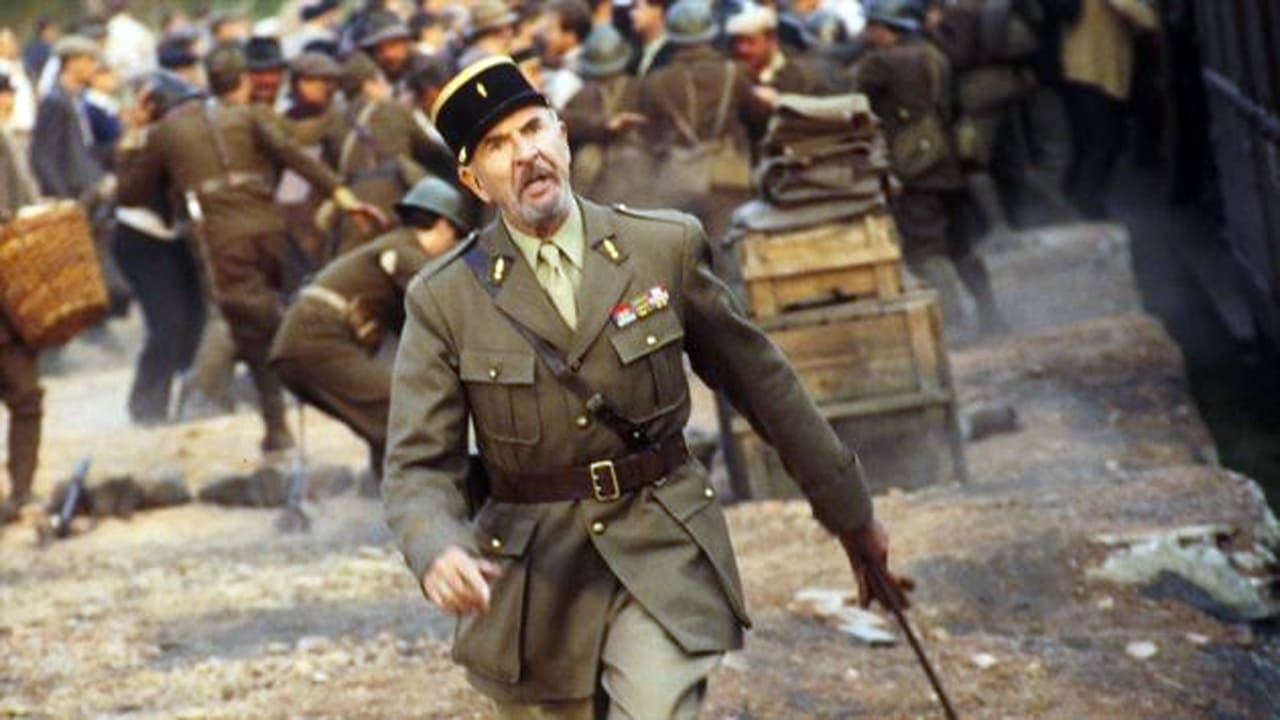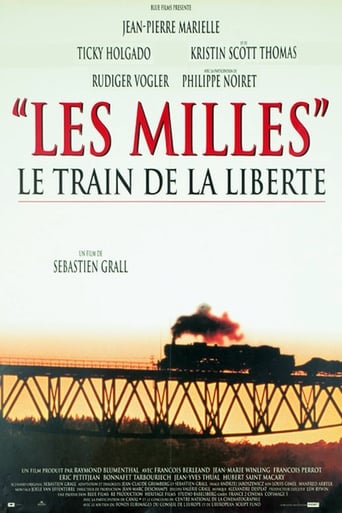



Good concept, poorly executed.
A waste of 90 minutes of my life
I have absolutely never seen anything like this movie before. You have to see this movie.
View MoreThe film never slows down or bores, plunging from one harrowing sequence to the next.
View MoreAt the launch of WWII in France, Germans, Austrians and axis allies living in France are sent to the concentration camp of Les Milles by the French government. In this camp, people from all background are forced to live together, may they be Nazis, spies, diplomats, visitors and refugees being artists, Jews, political dissidents, intellectuals or anyone in disagreement which fled the oppressing Nazi regime after Hitler's accession to power.Based on a true story, the movie is a fiction which brilliantly and modestly portrays the camp everyday life and its intricacies if not open conflicts when the prisoners are bound to be confronting their views. The camp at Les Milles really existed and is located near Marseille. It happened to welcome a certain number of famous figures such as artists, writers, and scientists. In the movie, they happened to attract the attention of an American journalist, played by Kristin Scott Thomas, only concerned about getting an interview with them and later saving their lives.Jean-Pierre Marielle plays a "more than true" captain Charles Perrochon who happens to be incapable to fight the war on the front against the Germans since, during WWI, he lost a lung as the result of gazing. He is then given the command of Les Milles. The movie is very efficient at rendering the hardships of keeping together a concentration camp with inadequate resources when not trained for this kind of duty. There are even scenes which show the director's ability to bring funny tones in this situation which surely had its share of awkward moments. Funny scenes have brought some energy to this slow paced movie which surely resembles concentration camp life and will displease people wishing an action packed war movie with a lot of haemoglobin or explosions. It is somehow more philosophical and intelligent since violence rarely erupts in the movie but interesting discussions do occur now and then.However, as the German continue to conquer France rapidly, the French government does not show honour and pride in their compromised bargaining when it comes to the fate of people considered undesirable by the Nazis, and the movie will show a disillusioned General wishing to save himself, excellently played by Philippe Noiret, which will accept to return the prisoners to the French police, meaning sending several people to their sure deaths as traitors to the Nazi regime.But, maybe this what this movie is all about, a bunch of people running around to save their lives as the "debacle", the rapid conquest of their country by the German army, approaches. Only a few keep their true sense of values in the face of danger and this maybe a very honest discussion telling us about ourselves.It is interesting to note that a higher percentage of Jews survived in France than in any other German-occupied country.However, there is the, often overlooked, other side of the medal where a large number of ordinary people remained faithful to their values and became heroes. The film shows us how normal, undistinguished Frenchmen, military personnel, who retained a sense of decency in the face of loosing a dreadful war becoming a human disaster. We can see how Perrochon's sense of human dignity called by his military code of honour led to disobedience to official Army orders to surrender their prisoners and ultimately to true heroism sheltering many lives, by organising the Freedom Train against all odds, rules and regulations. With the help of his reluctant officers, the commandant requisitions a train in a desperate attempt to shuttle his prisoners to Bayonne, where hopefully a freighter will take them to free Morocco. Moreover, access to freedom will not only be secured to a few selected elite as wished by the journalist but to all men seeking refuge thereby showing a universal sense of human dignity. The movie finds a much more active pace with suspense in the second part when the train journeys through France trying to stay away from all perils and trying to reach destination where a ship awaits for taking the runaways to Casablanca.I really think that this movie shows that the French have a lot to look at with pride when it comes to the fate of the people in danger during that very ugly war.
View MoreThis little gem gives us an interesting sociological view - showing the reaction and behaviour of the French people during the last days before the Nazi occupation of their country. The film shows us how normal, undistinguished Frenchmen, military personnel included, retained a sense of decency in the face of the "debacle", the rapid conquest of their country by the German army. They did not necessarily like the refugees in their charge, nor were they pro-semitic (like most French people at the time, most of them were probably mildly anti-semitic), but they were decent people, and they knew of the dangers awaiting those refugees once the Germans arrived. It is interesting to note that a higher percentage of Jews survived in France than in any other German-occupied country - again a testament of the decency of this much-maligned people. Watch Ticky Holgado as the "midi" army captain who follows his humane orders - to get the train to Bayonne - without actually evincing interest in the refugees themselves, a true Frenchman as has ever been presented on screen.
View MoreIn the beginning of the Second World War, Germans, Austrians and persons without nationality living in France are sent to the concentration camp of Les Milles by France government. Commander Charles Perrochon is the responsible for this camp and he promises to the leaders of the prisoners to protect them from the Nazis. When France is invaded by the Germans, Commander Perronchon will disobey orders and his superiors trying to save these men. He gets a train, a ship and money from USA to send about eight hundred of these prisoners to the safety of Casablanca, in Marrocos. The ironic end of this trial unfortunately is history and can not be changed. This movie is not a bad movie, but could be a great one. The screenwriter and the director should have extended much more in the political situation of France and Europe in 1940. Maybe this history is well-known in France, but I am in Brazil and I have never heard about this fact. I believe that viewers from many countries are in the same situation as me. Further, at least some important prisoners should be presented more carefully and deeply, maybe showing their lives before being arrested, to make the viewer understand their importance or social condition and be sympathetic with them. The way these prisoners are showed makes the viewer have no charisma with them. Such a beautiful true story deserved to be more carefully transported to the screens. The way this film is presented, only the altruism and outstanding personality of Charles Perronchon is showed. But, for example, it is not explained the cold relationship between his wife and him. The role of Phillipe Noiret is also too small for such a great actor. The brunet Kristin Scott Thomas has also a small but important character in the plot. My vote is seven.Title (Brazil): "Expresso Para a Liberdade" ("Express For the Freedom")
View MoreThis is a subject that deserved to be filmed:at the beginning of WW2,German political (or else)refugees came to France :there were artists (Max Ernst) ,a football champion,dwarves,Jews or soldiers who had refused to fight for Hitler.They arrived in the south of France where they thought they would be safe.The French had to improvise a camp,and the refugees to muck in:building latrines was not the least problem.But pretty soon,France was invaded by Hitler's armies and French officer(Philippe Noiret) decided to hand them over to their "compatriots".But his subordinate (Jean-Pierre Marielle) ,a resistant from the very beginning, requisitioned a train to take them to Spain.Jean -Pierre Marielle plays a convincing colorful officer with a big heart;Philippe Noiret in a very short part of a couldn't -care -less type,recalls the one he played in "il deserto dei Tartari" (1976).The directing is OK but hesitates between comedy (no to say farce) and drama.Besides,this situation was tailor-made to show the absurdity of war,and the scenarists do nor rise above the anecdotal.One can dream of what a Dino Risi or an Ettore Scola -it was a subject for an Italian director- would have made of it.Nevertheless, it's worth a watch.
View More